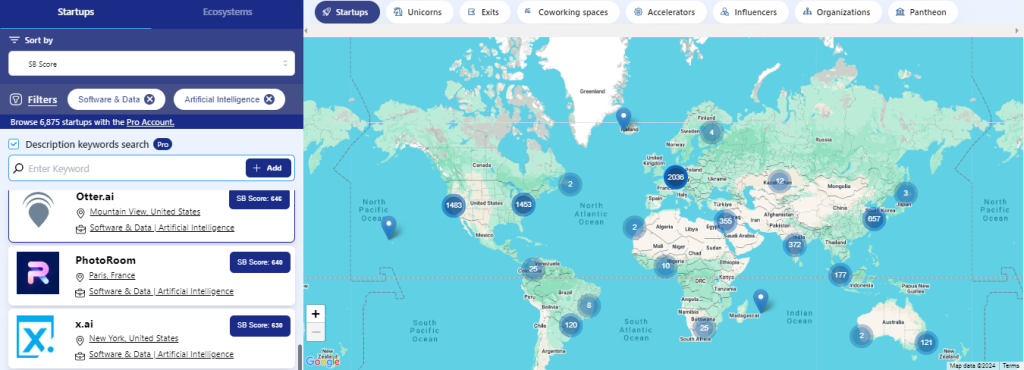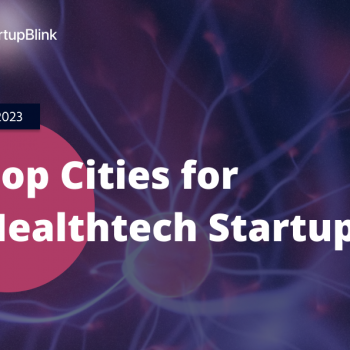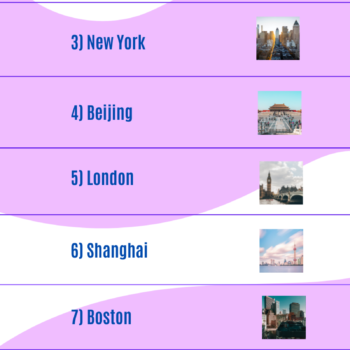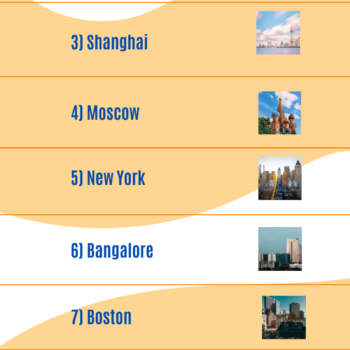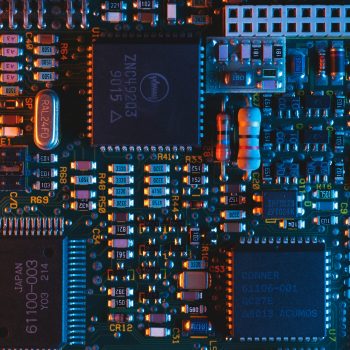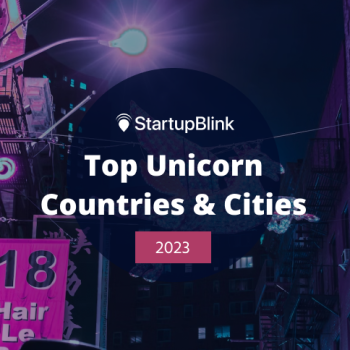In 2024, artificial intelligence is no longer the exclusive domain of technologists and futurists; it has firmly entered the mainstream. From fine-tuning our online shopping experiences to writing our emails, AI is now an integral part of everyday life. According to Crunchbase data, Q2’s total of $24 billion was the largest amount raised in a single quarter for the AI sector in recent years. Far from threatening to upend human existence, ai startups are focused on more practical goals: automating tasks, improving efficiency, and solving problems at scale. In this article, we represent the top AI startups of 2024, revealed by our proprietary algorithm—SB Score—which takes into account factors such as website traffic, investment, and quarterly employee count to rank startups powered by our data partners Crunchbase and Semrush. While some of these startups are working on creating their own artificial intelligence, others integrate existing AI solutions, such as OpenAI, into their platforms to disrupt their industries.
Would you like to integrate AI into your solution?
Consider joining the IBM for Startups program, giving you access to IBM’s watsonX platform with free cloud credits, as well as online sessions and schedule 1×1 technical advisory and consulting meetings. You’ll also pitch your solutions in front of global enterprises and investors and establish long term partnership with IBM and its customers. The program does not require any equity and is free to join.
What is an AI Startup?
An AI startup is a company that develops products or services rooted in artificial intelligence, with the aim of solving complex problems or improving efficiency. These businesses go beyond traditional software development by focusing on technologies that enable machines to learn, adapt, and make decisions, often mimicking human capabilities in areas such as language processing, image recognition, and decision-making. For example, startups like OpenAI, with its groundbreaking language model GPT, are advancing natural language processing, while companies like DeepMind have pushed the boundaries of AI in healthcare through their research in protein folding.

Types of AI Startups
AI is a versatile technology that not only drives innovation on its own but also integrates into various industries, reshaping fields like Healthtech, Fintech, and more. Here are some key types of AI startups leading the charge across different sectors:
Generative AI Startups: Generative AI creates new content—whether it’s text, images, or music—based on simple prompts. These startups are transforming creative industries by helping businesses generate content, write articles, or design product prototypes. Examples include OpenAI’s GPT and DALL·E, which assists in both creative and professional tasks.
Novel AI Startups: Novel AI startups push the boundaries of traditional AI applications, often focusing on specialized fields like healthcare or environmental science. These companies create new frameworks, such as AI-driven drug discovery or climate modeling, to unlock previously unreachable solutions.
Natural Language Processing (NLP) Startups: NLP startups develop AI systems that understand and interpret human language, enabling seamless communication between humans and machines. From chatbots to voice assistants, NLP is integral to industries like Fintech (fraud detection) and Healthtech (transcribing medical notes). Companies like DialogueFlow and Grammarly are leaders in this space.
Machine Learning Startups: Machine learning enables systems to learn from data and improve without explicit programming. These startups power personalized recommendations in e-commerce and credit risk analysis in Fintech, making machine learning one of the most adaptable and widespread AI technologies.
Computer Vision Startups: Computer vision allows AI to analyze and interpret visual data, from recognizing faces to detecting medical conditions in scans. In healthcare, it aids early disease detection, while in autonomous vehicles, it helps cars navigate safely.
Top AI Unicorns in 2024
A unicorn startup refers to a privately-held company that reaches a valuation of $1 billion or more. According to our methodology, Artificial Intelligence is a sub-industry within Software & Data, alongside other sub-industries such as Cybersecurity, Enterprise Technologies, and SaaS, among others. On our global unicorn map, there are 94 AI unicorns, representing 19% of all Software & Data unicorns, making it the largest sub-industry within this category in terms of unicorn representation. Below, we presented the top ai unicorns in 2024, sorted by their SB Score taking into account factors such as total investment, website traffic and employee count.
1. OpenAI
SB Score: 1000
Location: San Francisco, United States
OpenAI is a pioneering artificial intelligence research lab responsible for creating some of the most powerful AI tools today, such as GPT-3 and ChatGPT. It gained unicorn status early in its journey due to its ground-breaking advancements in natural language processing (NLP) and has continued to grow, particularly after launching its GPT models for public use. OpenAI OpenAI is a pioneering artificial intelligence research lab responsible for creating some of the most powerful AI tools today, such as GPT-3 and ChatGPT. It gained unicorn status early in its journey due to its ground-breaking advancements in natural language processing (NLP) and has continued to grow, particularly after launching its GPT models for public use. OpenAI collaborates with tech giants like Microsoft and has been pivotal in shaping modern AI capabilities.It also joined forces with companies like Google and Anthropic to form the Frontier Model Forum, focusing on responsible AI development.
2. ByteDance
SB Score: 790
Location: Beijing, China
ByteDance, the parent company of TikTok, has recently expanded its presence in generative AI with the launch of four new apps: Cici AI, Coze, ChitChop, and BagelBell, which target users outside of China. These apps, rolled out over the past three months, allow users to create and share chatbots or generate fictional stories. Cici AI, ChitChop, and Coze are platforms for bot creation, enabling users to develop personalized chatbots, while BagelBell is an interactive storytelling app where readers can influence the direction of the plot. Interestingly, despite ByteDance’s expertise in AI, the company did not develop the underlying large language models (LLMs) powering these apps. Instead, the apps rely on OpenAI’s GPT technology, accessed via a license from Microsoft Azure.
3. Anthropic
SB Score: 748
Location: San Francisco, United States
Anthropic, co-founded by former OpenAI executives, has gained significant recognition for its focus on AI safety and ethical development of large-scale models. One of its flagship products is Claude, a conversational AI model designed to prioritize safety and transparency. The company’s strong emphasis on building AI systems that are aligned with human values sets it apart in a competitive market. With its advanced research and thoughtful approach to AI risks, Anthropic is positioning itself as a leader in responsible AI development.
4. Hugging Face
SB Score: 732
Location: New York, United States
Hugging Face started as a chatbot company but evolved into a major open-source machine learning platform, providing tools that democratize access to AI models. Its popular “Transformers” library, used in a variety of NLP tasks, has positioned it as a leader in open AI development. Hugging Face’s unique approach to community-driven development has been a key driver in its growth and its status as the “GitHub of machine learning”.
5. Gong
SB Score: 689
Location: Palo Alto, United States
Gong is an AI-driven sales platform that transforms revenue growth by recording, transcribing, and analyzing sales calls to enhance sales effectiveness across teams. Its generative AI models distinguish themselves from standard systems by categorizing vast amounts of deal-specific data, such as customer objections, and interpreting the context and intent of conversations. This specialized capability allows Gong’s models to deliver highly accurate, relevant insights tailored to the unique needs of sales teams. By leveraging these insights, Gong empowers sales professionals to optimize their strategies, driving more precise decision-making and ultimately improving overall sales performance.
6. Outreach
SB Score: 684
Location: Seattle, United States
Outreach focuses on enhancing sales processes through AI-driven automation. Like Gong, Outreach leverages artificial intelligence to improve the effectiveness of sales teams by streamlining communication workflows and boosting performance. Its AI capabilities extend to automating tasks such as campaign creation, email personalization, and optimizing outreach efforts to generate more responses. The platform’s intelligent insights help sales teams identify the most effective strategies, leading to faster growth and improved sales outcomes.
7. ElevenLabs
SB Score: 669
Location: Brooklyn, United States
ElevenLabs, known for its AI-driven voice cloning technology, allows creators, enterprises, and others to replicate voices in multiple languages. The company is expanding its offerings with the upcoming launch of a dubbing studio and a voice library marketplace. These new products will enable users to seamlessly dub content into different languages with AI-generated voices and access a broad selection of voices for various creative and professional purposes.
8. Anduril
SB Score: 669
Location: Irvine, United States
Anduril is a defense technology company, but recently started to integrate AI and autonomous systems to its military applications. Its growth has been fueled by securing government contracts and developing innovative defense technologies such as autonomous drones and advanced surveillance systems. Recently, Anduril introduced Pulsar, an AI-enabled system designed to counter sophisticated electromagnetic threats. Pulsar can jam small to medium-sized drones and provide accurate geolocation for friendly forces. The system uses radio frequency machine learning to rapidly identify and neutralize potential threats, transmitting data to other systems to speed up response times. Anduril’s continuous focus on national security innovation and cutting-edge defense solutions has driven its rapid growth and elevated its status as a major player in defense technology.
9. Dataiku
SB Score: 654
Location: Paris, France
Dataiku is an AI and data science platform that enables organizations to design, deploy, and manage AI applications at scale. The platform is tailored for data scientists, analysts, and business teams to collaborate on building predictive models and machine learning pipelines. With a focus on democratizing data science, Dataiku’s platform integrates data preparation, machine learning, and model deployment into a single tool, helping businesses transition to AI-driven decision-making.
10. Megvii
SB Score: 651
Location: Beijing, China
Megvii, based in Beijing, is an AI technology company specializing in computer vision. It is best known for its facial recognition technology, which is widely used in China for security, finance, and urban management applications. Megvii’s flagship platform, Face++, powers a range of AI-driven products including surveillance systems, identity verification, and smart city solutions. The company’s AI technology is powered by deep learning algorithms and has been a key player in China’s “smart city” initiatives, where AI is used to monitor and manage large urban environments.
You can explore more artificial intelligence unicorns using our interactive unicorn map.
Top AI Startups in 2024
On our global startup map, more than 6,900 AI startups are represented, accounting for approximately 14% of all sampled Software & Data startups, making it the second-largest sub-industry in this category in terms of startup representation. Below, we present the top AI startups of 2024, sorted by their SB Score, which considers factors such as total investment, website traffic, and employee count. If you would like to reveal your startup’s score and rank within its industry and geography, you can add your startup to our map.
1. Gupy
SB Score: 743
Location: São Paulo, Brazil
Gupy is a Brazilian AI-powered recruitment platform that streamlines the hiring process for companies by using machine learning to match candidates with job openings. Its AI-driven system, known as Gupy Recruta, helps automate job applications, assess candidates’ skills, and rank applicants based on compatibility. The platform also provides tools for remote interviews and analytics, helping HR teams make data-driven decisions. Gupy’s significant growth in Latin America reflects the increasing demand for AI-based solutions in recruitment, especially in high-volume hiring markets like Brazil.
2. Inspur Cloud
SB Score: 712
Location: Jinan, China
Inspur Cloud is a leading provider of cloud computing and AI services in China. The company offers a comprehensive suite of cloud services, including infrastructure-as-a-service (IaaS), platform-as-a-service (PaaS), and AI-powered solutions. Inspur Cloud’s focus on AI extends to edge computing, smart city applications, and big data analytics. Its deep integration of AI with cloud services makes it a crucial player in China’s AI and cloud ecosystems, serving a wide range of industries, including finance, manufacturing, and government sectors.
3. Quillbot
SB Score: 707
Location: Chicago, United States
QuillBot is an AI-powered writing assistant designed to help users paraphrase and enhance their writing. The platform uses advanced machine learning models to improve clarity, style, and grammar. It is particularly popular among students, writers, and professionals who need help with content creation, academic writing, or summarizing text. QuillBot’s unique AI capabilities allow users to rephrase sentences or entire documents while maintaining the original meaning, and its user-friendly interface has made it a go-to tool for writing enhancement.
4. Helpshift
SB Score: 673
Location: San Francisco, United States
Helpshift is an AI-driven customer service platform that helps companies automate customer support processes. It integrates AI-powered chatbots and automated workflows to provide efficient, real-time support across mobile apps and websites. Helpshift’s platform is designed for scalability, helping businesses manage customer interactions while reducing costs. Its AI-based tools can resolve simple queries, escalate issues to human agents when necessary, and track customer satisfaction, making it a powerful solution for businesses looking to optimize their support operations.
5. Builder
SB Score: 657
Location: San Francisco, United States
Builder is an AI-powered platform that simplifies the app development process by automating much of the coding and design work. The platform allows non-technical users to build web and mobile applications quickly, using AI to suggest design elements, generate code, and integrate various functionalities. Builder aims to democratize software development by making it accessible to people without coding expertise, catering to businesses and entrepreneurs who want to launch apps without hiring full-scale development teams.
6. StudySmarter
SB Score: 650
Location: Munich, Germany
StudySmarter is an AI-powered learning platform that provides personalized study plans and resources for students. It uses machine learning to adapt content to each user’s learning style and progress, offering features such as flashcards, summaries, and quizzes. StudySmarter supports students from various educational levels and subjects, making it one of Europe’s leading edtech platforms. Its AI capabilities help students optimize their learning time and efficiency, improving overall academic performance.
7. OtterAi
SB Score: 646
Location: Mountain View, United States
Otter.ai is a transcription and note-taking platform powered by AI, widely used for converting voice conversations into written text. Otter.ai’s AI engine not only transcribes spoken words but also identifies speakers, summarizes key points, and integrates seamlessly with meeting platforms like Zoom. Its use of natural language processing (NLP) has made it popular for professionals, students, and content creators who need accurate and automated transcription services for meetings, lectures, and interviews.
8. PhotoRoom
SB Score: 640
Location: Paris, France
PhotoRoom is an AI-driven photo editing platform that allows users to easily remove backgrounds from images and create professional-looking visuals. Targeted primarily at small businesses, e-commerce platforms, and content creators, PhotoRoom uses AI to automate complex editing tasks, saving users time and enhancing their content production workflows. The platform is particularly popular for product photography, enabling users to create clean, professional images with minimal effort.
9. x.ai
SB Score: 630
Location: New York, United States
x.ai is an AI scheduling assistant that automates the process of setting up meetings. It integrates with users’ calendars and email systems, using natural language processing to handle scheduling requests and coordinate meetings without human intervention. The AI assistant, often branded as “Amy” or “Andrew,” can find mutually available times for meeting participants and send invites, streamlining the often tedious process of scheduling meetings for professionals.
10. CloudFactory
SB Score: 601
Location: Reading, United Kingdom
CloudFactory is an AI-powered workforce platform that provides scalable data labeling and processing services. It combines human workers with AI tools to manage complex data tasks for industries such as autonomous vehicles, healthcare, and e-commerce. CloudFactory’s hybrid model leverages AI to enhance the speed and accuracy of data processing while ensuring that human oversight remains integral to quality control. This model makes CloudFactory a valuable resource for companies looking to train AI models or handle large volumes of data efficiently.
The Rise AI for Startups
Artificial intelligence has evolved beyond being just a sub-industry within sectors like Software & Data. In 2024, AI will become a part of operations across nearly every industry, from healthcare and finance to e-commerce and education. Startups in different sectors are increasingly integrating AI into their solutions—not only to create new products but also to enhance operational efficiency and drive business growth. Whether through AI-powered chatbots, advanced data analytics, or automation tools, AI is helping companies streamline workflows, improve decision-making, and solve complex problems at scale.
If you’re a startup looking to integrate AI into your solution, consider joining the IBM for Startups program. This program provides access to IBM’s watsonX platform, along with free cloud credits, technical advisory sessions, and the chance to pitch your solutions to global enterprises and investors. Best of all, the program is free to join and requires no equity commitment.
FAQs
What is the highest valued AI startup?
ByteDance, the parent company of TikTok, is valued at over $200 billion, making it one of the most valuable private companies in the world. While ByteDance initially gained recognition for its social media and content platforms, it has increasingly become a major player in AI, particularly with its advanced content recommendation algorithms and recent forays into generative AI. However, OpenAI is eyeing a significant leap in valuation, with reports suggesting it may aim for a $100 billion valuation soon. This would be driven by its groundbreaking advancements in artificial intelligence, including its popular GPT models and strategic partnerships with major companies like Microsoft. As OpenAI continues to push the boundaries of AI technology and expand its commercial offerings, its valuation could increase substantially, potentially closing the gap with giants like ByteDance in the near future.
Where is the AI capital of the world?
San Francisco and the broader Silicon Valley region in California are widely recognized as the AI capital of the world. According to Global Startup Ecosystem Index 2024, San Francisco’s total score in AI is nearly four times greater than the next-ranked city, New York. This area is home to some of the most influential AI companies, such as NVIDIA and Google DeepMind. The ecosystem in Silicon Valley and San Francisco is unmatched due to its access to leading research institutions, a dense network of AI-focused startups, and substantial venture capital investments. This explains why a majority of AI unicorns, such as OpenAI and Anthropic, have emerged from this area.
What is the AI capital of Europe?
In the European tech scene, London is recognized as the AI capital, thanks to its strong ecosystem of startups, top-tier universities, and substantial government support for AI innovation. According to our algorithm, London scores 1.5 times higher than Paris in the AI industry. The city hosts major AI players such as DeepMind and benefits from an active venture capital market that helps drive the growth of advanced AI technologies. However, on a global scale, London ranks 4th in the AI industry, just below San Francisco, New York, and Beijing, indicating there is still room for London to catch up with these global leaders in terms of AI development and influence. Interestingly, this AI ranking is one position lower than London’s overall rank in the Global Startup Ecosystem Index.


